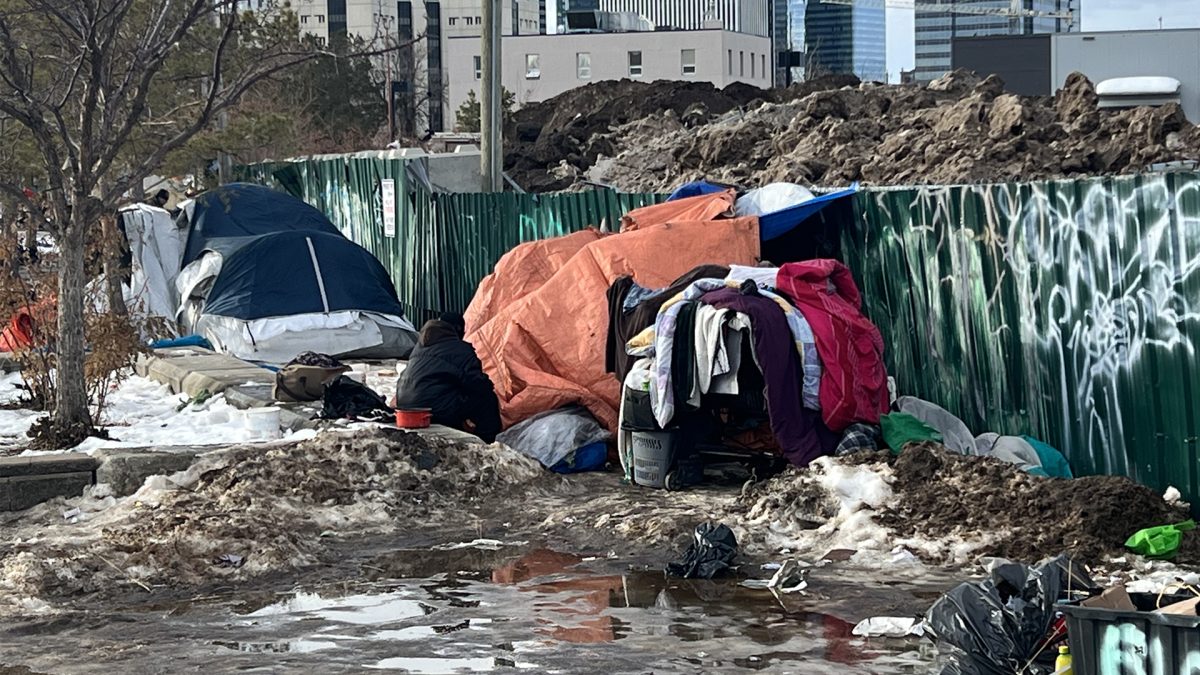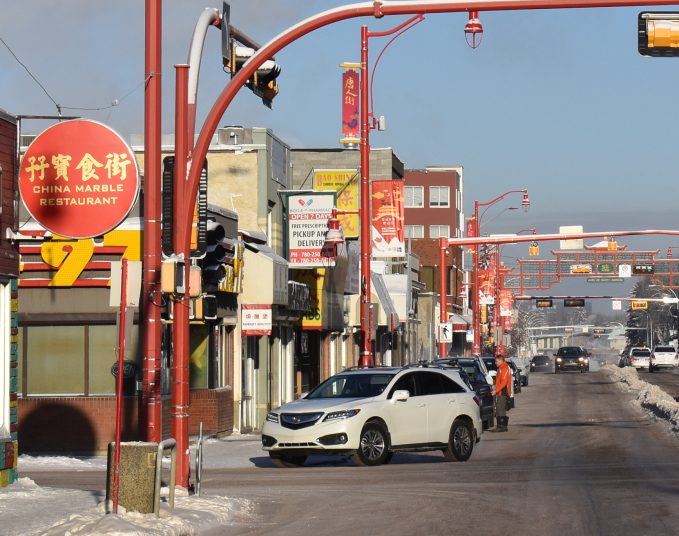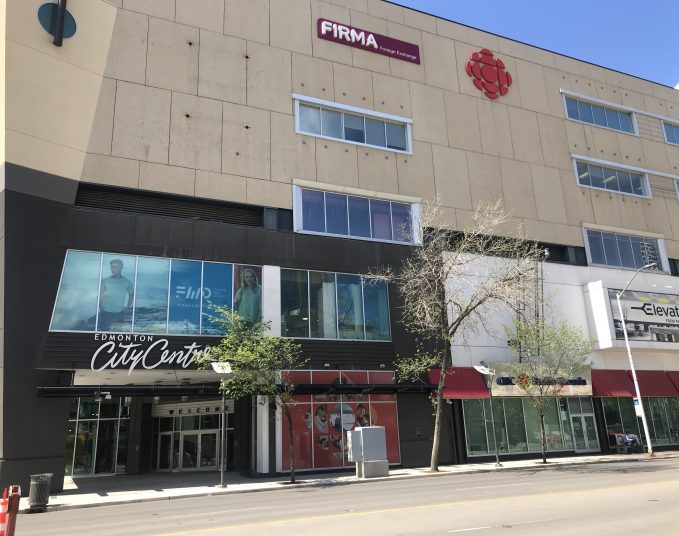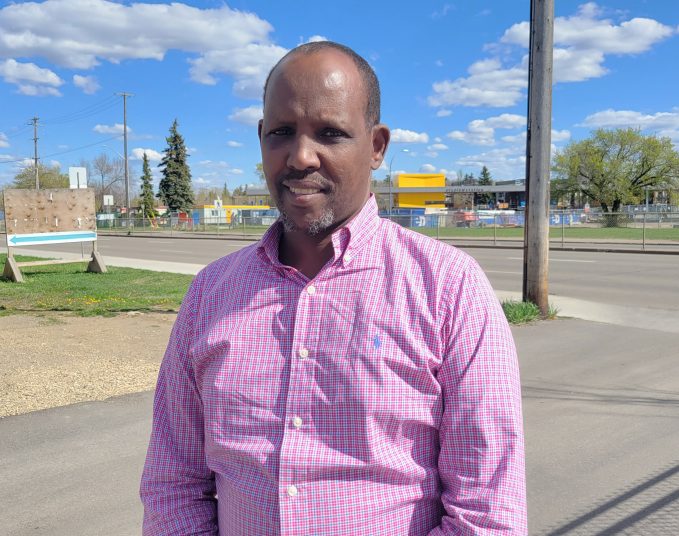The removal of a downtown tent encampment has raised concerns for Edmonton’s unhoused residents, as another cold snap approaches in a winter season that has seen unprecedented numbers of people camping outside.
Alex Caldararu said he was driving by the Bissell Centre on his way to his teaching job downtown on the morning of January 13 when he saw two police cruisers blocking off a road between 96th and 97th Streets, and at least two people in uniform picking up and moving tents. He said it’s the fourth time in the last two months he’s driven past a similar scene.
“I was not very happy seeing that,” he said.
“I think it’s a really sad indictment of where we are as a city that talks an awfully big game about ending street-level poverty and homelessness, and yet still relies on brute force and overt policing to forcibly displace people who have nowhere else to go.”
Police declined to comment specifically on the incident, saying the City takes the lead on encampment protocol, while the Edmonton Police Service “would be involved for the security and protection of all parties, and doesn’t determine where encampments are located.”
A City of Edmonton spokesperson said crews cleared debris from an encampment along 105th Avenue “because the debris obstructed the roadway and sidewalk, causing safety issues for drivers, pedestrians and those living in encampments.” The spokesperson said approximately 30 tents were removed, with about 10 to 15 people living in them, and that peace officers and EPS advised those people about the closure and cleanup date ahead of time.
Judith Gale, leader of the Bear Clan Beaver Hills House, a patrol group that provides supports and essential items for unhoused Edmontonians, was on patrol when tents were being removed that week.
Gale said most of the tents the Bear Clan has provided to people this winter have been torn down and hauled away, a cycle she is tired of watching repeat. Gale said she has seen peace officers slash tents, drag people outside, kick them while they’re sleeping, and take all their belongings away in a process she describes as a “home invasion.”
“The way they go about it is all wrong. They spend too much money on trucks, on peace officers, on cleanups, on all of this stuff, when they can do things that would help our brothers and sisters,” she said.
“It’s just retraumatizing our brothers and sisters over and over, and then they expect them to be good, upstanding citizens when they are in a state of turmoil and trauma all the time.”
Gale suspects it won’t be long before people move back into the same space surrounding the Bissell Centre, given the city’s lack of shelter space and supportive housing.
The City opened 59 private rooms for transitional housing last week at a former hotel on Stony Plain Road, operated by Jasper Place Wellness Centre, and has promised to open another 150 beds at the facility in phases. The city has about 1,300 shelter beds in total, which is not close to matching the number of unhoused people.
Homeward Trust has counted more than 2,770 houseless Edmontonians using numbers from various agencies this month, but just resumed its in-person homeless count in September – which could provide more accurate numbers – after taking a break during the COVID-19 pandemic.
In January 2019, a year before the pandemic began, Homeward Trust had counted just over 1,900 unhoused Edmontonians, and stated the city was on track to end chronic homelessness by 2022. The agency had previously set a goal of ending chronic homelessness by 2020.
Gale estimates there are at least 4,000 people now living on Edmonton’s streets, after the pandemic exacerbated the housing crisis here and abroad.
In November, authorities forcefully shut down Camp Pekiwewin, a tent community that housed hundreds through the summer and fall in a highly visible area of the Rossdale community. Volunteers were on site 24/7 to provide essential services, but tensions arose with neighbours and police in the lead-up to its closure.
Council had considered piloting three city-sanctioned summer encampments, but quashed the idea in July over concerns about cost and potential conflict with neighbours.
Unhoused people have suffered serious injuries and deaths this winter.
Firefighters responded to several fires at encampments during a cold snap in November, leading to at least five fatalities. Gale said she has spoken with people involved, including one man who told her he woke up to the “smell of burning flesh” to find his friend burning to death.
Meanwhile, data obtained by CBC in January showed 91 frostbite amputations were performed in Edmonton last winter, which is more than the previous three years combined.
City councillor Anne Stevenson, who first pitched the city-sanctioned encampments, said it is “very unprecedented” to see so many living in tents through winter.
Under the city’s current “risk matrix” approach, outreach workers go out to connect people with supports when encampments don’t pose an immediate safety risk, and those living in the tents are given a heads-up that their homes will be removed.
When an encampment is deemed to pose an immediate safety risk, it’s cleared as soon as possible with assistance from police.
“Without an option for shelter housing to move into, the likely outcome of dismantling an encampment is it is likely to pop up somewhere else,” said Stevenson, whose ward includes the Bissell Centre.
“I think any Edmontonian can see that traps us in a pretty vicious cycle, pretty quickly.”
In December, council voted 12-1 to halt an $11.5-million proposal over four years that would have beefed up enforcement to deal with encampments. Stevenson said harm reduction is the main goal, and the current model is not making anyone happy.
Mayor Amarjeet Sohi has said the houselessness problem was created by government policy, and placed the blame on the provincial government. Stevenson echoed the need for provincial action, saying shelter and health are squarely within provincial jurisdiction.
“The only truly effective response to encampments is to have adequate housing and supports for people who are currently unhoused,” she said. “Anything short of that, we’re not really able to effectively manage the problem.”
Savvy AF. Blunt AF. Edmonton AF.




